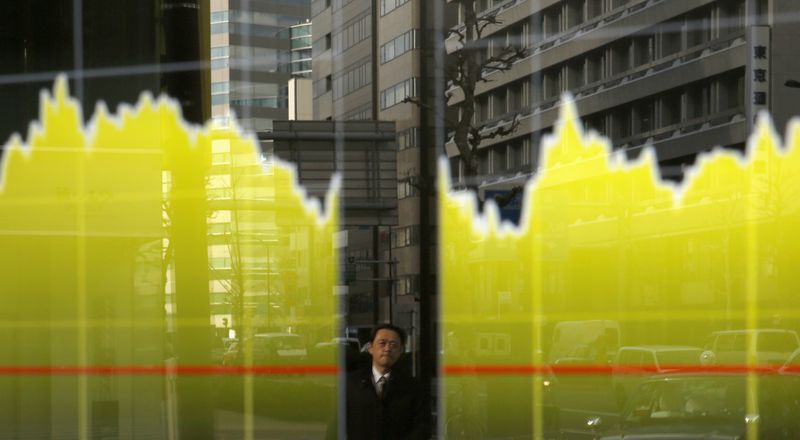TOKYO, July 1 (Reuters) - Japanese shares ended lower on
Wednesday as the Bank of Japan's quarterly corporate survey
showed business mood dropped to the worst level in 11 years,
while the continued spread of COVID-19 cases in Tokyo also
sapped risk appetite.
The benchmark Nikkei average .N225 ended 0.75% lower at
22,121.73.
The Bank of Japan's tankan survey showed the mood among big
manufacturers declined to minus 34 last month from minus 8 in
March.
The BOJ survey also indicated that big firms plan to raise
capital expenditure by 3.2% in the current fiscal year through
March 2021, higher than initially expected.
Investor sentiment was dealt another blow after Japan's
Chief Cabinet Secretary Yoshihide Suga said the coronavirus
state of emergency could be re-imposed in a worst case scenario.
Tokyo has sought to keep new COVID-19 cases below 20 a day
since Japan lifted a state of emergency in late May, but has had
six straight days of more than 50 new cases, as of Wednesday.
E-mini futures for the S&P 500 .Esc1 were last quoted down
0.47%, further pressuring Japanese shares.
All of the 33 sector subindexes on the Tokyo exchange traded
in the red. Pharmaceutical .IPHAM.T and textile .ITXTL.T
stocks declined the most, falling more than 2% each.
Automobile shares weakened despite the softer yen, as the
BOJ survey indicated sentiment among large automobile
manufacturers declined to minus 72 from minus 17 in March.
Suzuki Motor Corp 7269.T dropped 4.51%, Honda Motor Co Ltd
7267.T fell 2.03% and Nissan Motor Co Ltd 7201.T declined
1.63%.
The broader Topix .TOPX dipped 1.29% to 1,538.61, its
lowest since mid-June.
- English (USA)
- English (UK)
- English (India)
- English (Canada)
- English (Australia)
- English (South Africa)
- English (Nigeria)
- Deutsch
- Español (España)
- Español (México)
- Français
- Italiano
- Nederlands
- Português (Portugal)
- Polski
- Português (Brasil)
- Русский
- Türkçe
- العربية
- Ελληνικά
- Svenska
- Suomi
- עברית
- 日本語
- 한국어
- 简体中文
- 繁體中文
- Bahasa Indonesia
- Bahasa Melayu
- ไทย
- Tiếng Việt
- हिंदी
Nikkei drops on gloomy BOJ tankan, COVID-19 concerns
Published 07/01/2020, 03:10 PM
Updated 07/01/2020, 03:20 PM
Nikkei drops on gloomy BOJ tankan, COVID-19 concerns

Latest comments
Install Our App
Risk Disclosure: Trading in financial instruments and/or cryptocurrencies involves high risks including the risk of losing some, or all, of your investment amount, and may not be suitable for all investors. Prices of cryptocurrencies are extremely volatile and may be affected by external factors such as financial, regulatory or political events. Trading on margin increases the financial risks.
Before deciding to trade in financial instrument or cryptocurrencies you should be fully informed of the risks and costs associated with trading the financial markets, carefully consider your investment objectives, level of experience, and risk appetite, and seek professional advice where needed.
Fusion Media would like to remind you that the data contained in this website is not necessarily real-time nor accurate. The data and prices on the website are not necessarily provided by any market or exchange, but may be provided by market makers, and so prices may not be accurate and may differ from the actual price at any given market, meaning prices are indicative and not appropriate for trading purposes. Fusion Media and any provider of the data contained in this website will not accept liability for any loss or damage as a result of your trading, or your reliance on the information contained within this website.
It is prohibited to use, store, reproduce, display, modify, transmit or distribute the data contained in this website without the explicit prior written permission of Fusion Media and/or the data provider. All intellectual property rights are reserved by the providers and/or the exchange providing the data contained in this website.
Fusion Media may be compensated by the advertisers that appear on the website, based on your interaction with the advertisements or advertisers.
Before deciding to trade in financial instrument or cryptocurrencies you should be fully informed of the risks and costs associated with trading the financial markets, carefully consider your investment objectives, level of experience, and risk appetite, and seek professional advice where needed.
Fusion Media would like to remind you that the data contained in this website is not necessarily real-time nor accurate. The data and prices on the website are not necessarily provided by any market or exchange, but may be provided by market makers, and so prices may not be accurate and may differ from the actual price at any given market, meaning prices are indicative and not appropriate for trading purposes. Fusion Media and any provider of the data contained in this website will not accept liability for any loss or damage as a result of your trading, or your reliance on the information contained within this website.
It is prohibited to use, store, reproduce, display, modify, transmit or distribute the data contained in this website without the explicit prior written permission of Fusion Media and/or the data provider. All intellectual property rights are reserved by the providers and/or the exchange providing the data contained in this website.
Fusion Media may be compensated by the advertisers that appear on the website, based on your interaction with the advertisements or advertisers.
© 2007-2024 - Fusion Media Limited. All Rights Reserved.